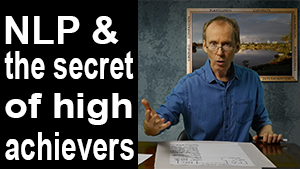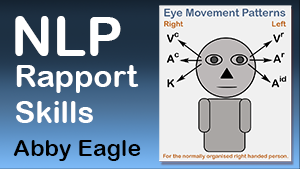
Learn how to build better relationships and improve self confidence and self esteem starting with a sense of acknowledgement... Phone 07 5562 5718 or send an email to book a free 20 minute telephone or Skype session with Abby Eagle. NLP Coaching, Hypnotherapy and Meditation. Gold Coast, Robina, Australia. Online NLP Coaching sessions on Skype and by phone also available.
Learn to Celebrate Yourself and Build Self Confidence and Self Worth Using NLP & Neurosemantics

Start with acknowledgement.
(Abby Eagle) Have you ever spoken to someone and the other person did not listen? They might have responded by giving advice or changed the topic. So what does it feel like to not be acknowledged? Let us explore two examples. The first from my personal experience.
One evening I told a friend that my health was not good. He immediately mismatched and asked me if I had tried a range of remedies. His intention was positive in that he wanted to help but he did not establish rapport through a basic acknowledgement of what I had said. In addition he did not validate me for my prior efforts to improve my health. Does that sound familiar?
In another example, this time from the film, Terminator 2: Judgement Day, John saves his mother from being killed by the Terminator robot but rather than expressing gratitude she gets angry at her son and tells him that his life is more important than hers. Her intention is positive but she failed to acknowledge, validate or celebrate John's efforts (until later in the film). He felt rejected and cried.
Does your doctor, naturopath, teacher, mother, father, brother, sister, colleague, friend, partner etc., acknowledge you for the efforts that you have made or do they habitually mismatch, discount and give advice? Which feels better? To be ignored or have them meet you face-to-face and say, "Yes, I see you, I hear what you are saying, I sense this is important to you?"
What does it take to acknowledge someone? Sometimes it might just be a look, a head nod, a simple "yes" or, "I hear what you are saying."
Click the Image to Watch on YouTube
How do we recognise acknowledgement?
When we acknowledge someone we sort for sameness, we match - we sort for what is right, we agree. Which is a good starting point to build rapport, liking and a sense of trust which in itself forms the basis for a healthy relationship, whether that relationship be as simple as paying for grocery items at a supermarket; a business or personal relationship, or the relationship that you have with your self.
Acknowledge means to express recognition, thanks or gratitude as in, "Thanks for that." Or, "I heard what you said." Acknowledgment is a simple recognition. We can also acknowledge with body language and gestures - by turning our body towards the other, by looking at the person and nodding our head, or raising our hand in a gesture of acknowledgement. For example, if you have ever watched interviewer Ellen DeGeneres you will see how she nods her head, and utters, "Yes, yes." Her body posture is similar to the guest and turned slightly towards her. Physiological rapport in itself is also an acknowledgement. In the process of acknowledgement we are 'counting' rather than discounting. In effect we are saying, "That counts".
Acknowledgment starts with the present state, the present situation - that is where you are right now. Once you have accepted and defined the present situation then you can begin the process of mapping out a desired outcome. We pace and then we lead.
From acknowledgement to validation to celebration.
During a meeting, let's say a staff meeting, participants may be invited to make suggestions. The team leader acknowledges each suggestion with a turn of the head in their direction, a head nod. At times the head nod may be longer, more deliberate in which case the leader is obviously giving more time, more attention, more energy, more weight to the suggestion. The leader says, "That is a good suggestion."
In doing so we give more than just an acknowledgment - in some way we give additional value to the suggestion and we begin the process of validation. Validation builds upon the foundation of acknowledgement and confirms the truth of something. The participant feels like they got more than a simple acknowledgment. They feel like their suggestion had value and so they feel validated.
At the end of the meeting the team leader makes a decision on which suggestion to go with. At this point the team members are invited to celebrate the contribution given by all the participants but with greater emphasise given to the one whose idea was chosen. The energy builds from acknowledgement to validation until with additional energy it becomes a celebration.
Celebration is to praise, rejoice and publicly proclaim with positive emotion, for example. "Great stuff! That is fantastic. This is impressive. You have done well."
What if we took more time to acknowledge both ourselves and others?
So how do we get to feel more acknowledged, validated and celebrated? We start by practising on others. We pay attention to what others say and do and then we give a simple acknowledgement. By learning to recognise the moments when an acknowledgment is in order we then have to search for words to express it. If you have been the type of person to discount, gloss over, ignore, give advice or shift the topic of conversation then it may take some practice.
Once you have learned how to acknowledge others then you should find that it becomes natural to apply to self. If not, then try giving yourself permission to do so. In acknowledging self you build self confidence and self esteem. And as you practise acknowledgment the energy will naturally flow towards validation and celebration, and eventually the thought should arise in the mind, "I can celebrate myself!"
What are the benefits of learning how to acknowledge, validate and celebrate?
Michael Hall, NS/NLP Trainer has made the following observation. "What I have noticed among those who are coaching at the PCMC level is that they go faster by going slower. They get to the heart of the matter faster by slowing the client down and feeding back to the client through acknowledgments and testing questions and clarification questions so that they are getting a rich and detailed understanding — and they are doing so with fewer and fewer words from the client." Michael Hall [Meta-Coaches] 2013 Meta-Coaching Reflections #29
If you are interested in a NLP Coaching session then feel free to contact me using the contact form on this page.
Share With Friends













